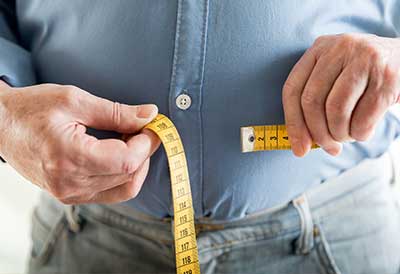Your Metabolism & Weight Loss: Rethink Everything You’ve Been Told
Study Counters Belief that Metabolism Declines in Adulthood
It’s a common belief that the reason our midsections expand and weight packs on as adults is because our metabolism is slowing down. But, we’re wrong according to new research published in the journal, Science. Yes, metabolism does change as we age, but not the way we think it does. From birth until adult characteristics are established, metabolism gradually declines. However, from age 20 to 60, human metabolism stays relatively stable. In other words, when we’ve pointed our finger at our slowing metabolism as the cause of our weight gain in our middle-adult years, we’ve been wrong. The research is based on data from more than 6,400 people, ages 8 days to 95 years, from 29 countries. Ultimately, this highlights the importance of personal metabolism when it comes to diet, health, and weight loss.

Why Am I Gaining Weight?
Factors that play a role in weight gain, do not include a slowing metabolism in adulthood, says new science, but may involve:
Is it Normal to Gain Weight as An Adult?
According to the research study, weight gain that may be occurring in your adult life is not because an older body burns fewer calories – as it in fact is burning the same calories as it did when you were in your 20s. Instead, the reason you are struggling with weight loss is a complex web of different lifestyle factors, including sleep, physical activity, food choices, and stress. In other words, there is not one food, nor one lifestyle change that will cause you to lose weight. Weight loss is possible, but to get there you need to consider your personal metabolism and body’s needs to create a healthy lifestyle plan that’s tailored to work for you.
How to Determine Your Metabolic Rate?
In the study noted above, the researchers determined metabolic rate by having the participants drink water, in which some of the hydrogen and oxygen were replaced with isotopes that the researchers could trace to see how much energy a person burned in the day. Luckily, you don’t need to sign up as a participant in a research study to determine your metabolic rate. There’s another way to test your Resting Metabolic Rate (RMR- your oxygen consumption at rest). RMR tests are available to guests at the Pritikin Center, under the guidance of Exercise Physiologists, such as Carol Espel, MS. No invasive procedure. No exercise is required. Carol explains that knowing your metabolic rate is a valuable tool that can be used to create a personalized exercise program, programmed for your body. “This more specific and individualized value, coupled with the testing from the medical department, helps us learn more about you, so we can build a highly individualized exercise program and train you more effectively.”
How to Improve Your Metabolism and Lose Weight
The key to successful weight loss is discovering your body awareness (how your body is responding to different types of exercise), and ways to get your metabolism functioning most effectively, explains Carol. Science shows that muscle is a key factor in metabolism and weight loss. “When you exercise, you stoke your proverbial metabolic fire – sort of like how you stoke a fire in the furnace.” Both cardio exercise and strength training help you build muscle over all, just in different ways. Muscle burns energy (calories) at rest, especially after exercise; meanwhile fat tissue uses very few calories. Putting on muscle can help you make positive metabolic changes.

What to Eat to Improve Your Metabolism
Despite popular myth, no food will improve metabolism, according to Registered Dietician, Kimberly Gomer. “Muscle is metabolic currency.” What should you eat to improve your body composition, so it can contain more muscle? Kimberly suggests eating a whole foods diet, “which will look different for each person depending on their lifestyle, labs, and goals.” It’s best to avoid sugary and processed foods if your goal is to decrease body fat. Research confirms that blood sugar plays a big role in how hungry you are, explaining why some people find it difficult to lose weight and the importance of personal metabolism in diet and health.
Ultimately, Kimberly recommends a healthy lifestyle: “The best way to change your body composition is to exercise daily, and eat a whole foods diet which includes healthy proteins (e.g. plant-based proteins like beans, some fish and poultry, very limited red meat) for muscle and repair.” The Pritikin Eating Plan is designed to optimize metabolism and decrease risk factors for many common diseases, including heart disease.
How to Determine Your Body Composition?
The best way to stay motivated is to see results from your efforts to make a healthy transformation – and the scale is definitely no help! Ditch the scale, and use science instead. You can take a sneak peek inside your body to determine your body composition (or bone density) with a non-invasive scan, called a DEXA scan. A DEXA body composition scan can be very motivating! It’s just one of the many extensive services from the medical program at the Pritikin Center, in Miami, Florida.

How to Lose Weight: Use Quality Science
Successful weight loss isn’t about not eating carbs or working up more of a sweat. Science shows us that achieving a healthy body weight is a more intricate equation, with a solution that’s simpler than many believe. “When you get new research, you want to look at the quality of the study,” notes Carol. The experts at Pritikin are a science-based bunch. Pritikin has an exercise science department, that’s always looking for new research to help them better understand the human body. “It’s a huge differentiator for Pritikin, compared to any other facility,” remarks Carol.
“The study says men’s and women’s metabolisms do not change in ways we previously thought – we don’t see real changes in metabolism until the age of 60,” explains Carol. She also points out another important aspect of the research: men are not different than women, as was previously thought. (Carol has some helpful pointers for women who are looking to effectively lose hormonal belly fat, that’s backed by science.) Reading studies, such as this one, which is debunking how we look at weight gain in our adult years, allows Pritikin to offer guests the most effective, science-backed, healthy-lifestyle programs.
Your weight loss story can have a happily ever after
Addressing your unique body’s needs, with a comprehensive lifestyle modification, created by experts using science-based information, you can get it all, at the Pritikin Center. Carol explains, “when you come to Pritikin, you work with the medical team, nutrition team, exercise specialists (all of whom have degrees in the field), and enjoy a curated menu – put that all together and it’s a win-win for everyone – it’s very difficult to find this anywhere else.”


